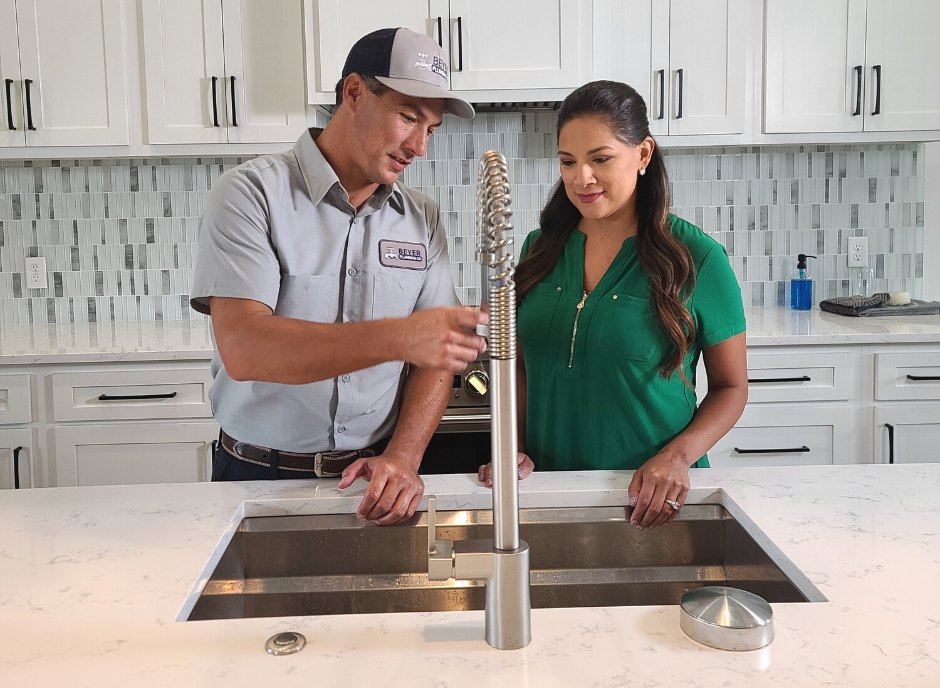How do you feel in relation to What Causes Leaky Faucets & How To Fix Them?

Dripping taps might appear like a small inconvenience, however their impact exceeds simply the inconvenience of the noise. From wasting water to sustaining unnecessary financial prices and wellness risks, ignoring a leaking faucet can bring about numerous consequences. In this short article, we'll explore why it's critical to resolve this usual household issue quickly and properly.
Waste of Water
Environmental Influence
Leaking taps add significantly to water wastage. According to the Environmental Protection Agency (EPA), a solitary faucet dripping at one drip per secondly can throw away more than 3,000 gallons of water per year. This not only pressures water sources but additionally influences communities and wildlife depending on them.
Financial Costs
Boosted Water Bills
Beyond the ecological effect, leaking taps can blow up water costs significantly. The accumulated waste in time equates into higher utility expenses, which might have been stayed clear of with prompt repair work.
Possible Property Damage
Moreover, prolonged dripping can lead to damage to fixtures and surface areas bordering the tap. Water build-up can create staining, deterioration, and even architectural problems if left neglected, leading to added repair service costs.
Health and wellness Problems
Mold and Mildew Development
The consistent existence of dampness from a trickling tap creates an excellent environment for mold and mold development. These fungi not just compromise indoor air quality however additionally posture health dangers, especially for individuals with breathing problems or allergies.
Waterborne Diseases
Stagnant water in trickling taps can become a breeding ground for microorganisms and various other pathogens, increasing the risk of waterborne diseases. Contaminants such as Legionella bacteria flourish in stationary water, possibly leading to serious health problems when ingested or inhaled.
Do it yourself vs. Professional Fixing
Pros and Cons of DIY Repair
While some might try to repair a leaking faucet themselves, DIY repair services include their very own set of obstacles. Without proper understanding and devices, do it yourself attempts can worsen the issue or result in insufficient fixings, prolonging the problem.
Benefits of Employing a Specialist Plumber
Working with a professional plumber guarantees that the underlying root cause of the trickling faucet is addressed effectively. Plumbing technicians have the experience and equipment to detect and fix faucet problems effectively, saving time and reducing the danger of additional damages.
Step-by-Step Overview to Repairing a Dripping Tap
Devices Called for
Prior to trying to deal with a trickling tap, gather the required tools, including an adjustable wrench, screwdrivers, replacement parts (such as washing machines or cartridges), and plumber's tape.
Usual Faucet Issues and Their Solutions
Recognize the type of faucet and the specific concern triggering the drip. Typical problems include damaged washing machines, corroded shutoff seats, or malfunctioning O-rings. Refer to supplier directions or online tutorials for step-by-step support on repairs.
Safety nets
Regular Maintenance Tips
To stop dripping taps, perform regular maintenance such as cleansing aerators, inspecting for leaks, and replacing worn-out components quickly. Additionally, take into consideration setting up water-saving tools or updating to a lot more effective fixtures.
Value of Prompt Repair Works
Resolving trickling taps as quickly as they're discovered stops further water wastefulness and possible damages, ultimately conserving both water and money over time.
Influence On Building Worth
Understanding of Well-Maintained Building
Preserving a home in good condition, including resolving maintenance concerns like leaking taps, boosts its perceived worth and desirability among prospective customers or tenants.
Influence on Resale Worth
Properties with well-kept plumbing fixtures, including faucets, command higher resale values in the realty market. Resolving trickling taps can add to a favorable perception during residential property inspections and negotiations.
Ecological Duty
Specific Payment to Preservation
Taking obligation for repairing dripping taps lines up with more comprehensive initiatives towards water conservation and ecological sustainability. Every individual's activities jointly make a considerable impact on protecting precious resources.
Lasting Living Practices
By focusing on timely repairs and adopting water-saving routines, individuals add to lasting living practices that profit both present and future generations.
Verdict
Resolving a trickling tap surpasses mere benefit; it's a vital step towards preserving water, minimizing financial prices, and safeguarding health and building. Whether with DIY repair services or professional help, acting to take care of leaking taps is a little yet impactful means to promote responsible stewardship of resources and add to a much healthier, a lot more sustainable future.
How to Fix a Leaky Faucet: Step-by-Step Repair Guide
A leaky faucet may seem like a simple annoyance, but if it's not fixed promptly, that leak could cost hundreds to potentially thousands. From water damage to mold, mildew, and high water bills, even a tiny leak can be catastrophic if left unattended. Damage like this can even affect the overall value of your home, so it's important to take the right approach for leaky faucet repair. You may need the help of a plumber in some cases, but we've got a few tips you can try on how to fix a leaky faucet before calling the pros.
Four Faucet Types
When you're learning how to fix a leaky faucet, the first step is knowing what kind of faucet you're working with! There are four common types.
Cartridge Faucets
Cartridge faucets come in one- or two-handled varieties. In one-handled cartridge faucets, hot and cold water combines in a single cartridge. In the two-handled versions, hot and cold water are controlled separately and mixed in the faucet.
Ball Faucets
Ball faucets have a single lever you push up and down to adjust the pressure and rotate to change the temperature. A slotted metal ball controls the amount of water allowed into the spout.
Compression Washer Faucets
They're the oldest type of faucet, but they're still used in many homes — especially older ones. Compression faucets have two separate handles that, when turned, raise or lower the washer that seals a water valve. This valve stops water from flowing through the faucet when it is turned off.
Disc Faucets
Disc faucets rarely need to be repaired due to their maintenance-free design. The water flow is controlled by two discs — the upper one raises and lowers against a fixed lower disc, creating a watertight seal. If your disc faucet starts leaking, you may need to replace the seals or clean residue buildup from the inlets.
Fixing a Leaky Faucet
Step 1: Turn Off the Water
Whether you're learning how to fix a leaky bathtub faucet or how to fix a leaky kitchen faucet, always turn off the water supply to your working area when you're fixing a leak. The last thing you want is a flood added to your list of things to fix.
Look for the shutoff valves below your sink or around the tub and turn them clockwise to stop the water flow. If your faucet doesn't have shutoff valves, you may need to turn off the water for the whole house. Check to make sure it's off by turning the faucet on. If nothing comes out, you're ready to start the repair.
Step 2: Take Apart the Faucet
How you disassemble your faucet depends on the type of fixture you have. You can use a flathead screwdriver to remove the caps on top of the handle or handles for cartridge and compression faucets. Inside, you should see handle screws. Unscrew these with a screwdriver to remove the handle.
Disc- and ball-style faucets will typically have an inlet screw near the handle, and removing that will reveal the interior of the faucet.
Detach the Valve Stem
For cartridge- and compression-style faucets, you'll see the inner valve stem or cartridge once you remove the faucet handles. If you have a compression faucet, unscrew the brass valve stem. If you have a cartridge faucet, pull out the cartridge. If your cartridge has been in place for a while, it may require some tools or extra force to remove it due to mineral deposits.
Examine and Replace Parts
Once you've removed the parts, check them out to confirm what needs to be replaced. You may see corroded rubber washers, O-rings, stems, or cartridges. On a ball-style faucet, check the seats and springs for damage.
If you need to repair a leaky disc faucet, check the inlet and seals on the lower disc.
Once you determine what parts must be replaced, visit your local hardware store. Bring the damaged parts with you to ensure you can purchase the correct components to replace them.
Clean Valves and Faucet Cavity
If you've removed a stem or cartridge, you may notice mineral buildup in the faucet's threads. Use white vinegar to clean the valve seat by soaking it for a few minutes, then scrub it away with a soft toothbrush and rinse with warm water. You can also clean the interior of the faucet in the same way.
Reassemble the Faucet
Once your faucet is cleaned and the required parts have been replaced, it's time to reassemble it. Put the pieces back together and slowly turn the water supply back on. Doing this slowly is crucial because too much initial water pressure can damage the new hardware you've just installed.
https://homewarranty.firstam.com/blog/how-to-fix-leaky-faucet

As a passionate reader on 4 Common Reasons for a Leaky Faucet, I imagined sharing that piece of content was worth the trouble. Make sure you take the opportunity to share this post if you enjoyed it. Thank-you for taking the time to read it.